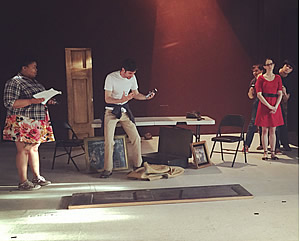David Arcus is new to Greenville, with two important posts; he teaches organ and sacred music on the ECU Sacred Music faculty and is the new organist and choirmaster at St Paul’s Episcopal Church. He publicly introduced himself on Friday with a ripsnorter of a recital at St. Paul’s.
Arcus’ program, almost perfectly chronological in layout, was well-designed to indicate his total proficiency in playing the organ music of most eras and genres. He began with a Præludium in C by J. S. Bach’s possible teacher Georg Böhm (1661-1773). The opening notes announced with great certainty that Arcus would play with his usual finesse. There were crisp and jaunty passages and a happy fugue, played both musically and precisely.
A Fantasy by William Byrd from the Fitzwilliam Virginal Book was next. With even a few stops drawn, the organ was quite loud. There were one or two of the wonky harmonies that Byrd is known for. Multiple manual changes were more obvious visually than musically.
Nicolas de Grigny (1672-1703) is to many both the creator and the perfector of the classical French organ style of the late seventeenth and early eighteen centuries. His “Récit de Tierce en taille,” one of the nine Gloria versets from the Premiere livre d’orgue of 1699/1711, is a standard touchstone for demonstrating both keyboard facility and the tierce stops of an organ. Arcus’ playing was stately, totally idiosyncratic, and displayed his sure command of both the music and the instrument.
J. S. Bach’s Pièce d’orgue also known as the Fantasy in G (S. 572) undoubtedly plays in rotation on the merry-go-round in Heaven; it could be similar to this jolly performance. The second part was quite stately, featuring rolled chords, an interesting choice by Arcus. The volume was continually seamlessly increased, until the feverish end was reached.
The French organist Maurice Duruflé (1902-1986) was a pupil of Charles Tournemire (1870-1939). During 1956-58, Durufle transcribed Touremire’s Improvisation on the Te Deum from phonograph records. Arcus played this version of Tournemire in a very dark and forceful style, creating visions of the murky aisles of ancient France.
Daniel Pinkham (1923-2006) composed his twelve-tone Prophecy for Organ for the dedication of the second Fisk organ (Opus 139, 2011) to be built for the Memorial Church at Harvard. It is a brief piece, rising arc-like to a powerful triumph, then sinking again to a soft conclusion. Arcus painted this arc on the St. Paul’s keyboard with his usual élan.
North Carolina composer Dan Locklair was commissioned to write a piece for the massive restoration and seventieth anniversary of the Aeolian organ in Duke Chapel. The central movement of the Aeolian Sonata is entitled “Shalom.” Arcus brought out the quintessential elements of Locklair’s delightful composition.
To conclude a masterful evening, Arcus played his own Variations on Beçanson, a traditional French Noel better known to us as “People Look East.” The heart of any Arcus program is Arcus’ own compositions, pure and simple. These six variations, Duo I, Duo II, Moderato, Molto sostenuto, Vivace, Adagio cantabile, and the terminating Fugue & Finale, were spritely and cheerful, powerful, and impressively demanding.
An encore was the Allegro from Concerto in D by David Durkop (b. 1956), an organist and composer who lives and works in Durham..
Arcus fills a serious gap in the musical life of eastern North Carolina. The audience showed their appreciation for his arrival with a totally appropriate standing ovation.











